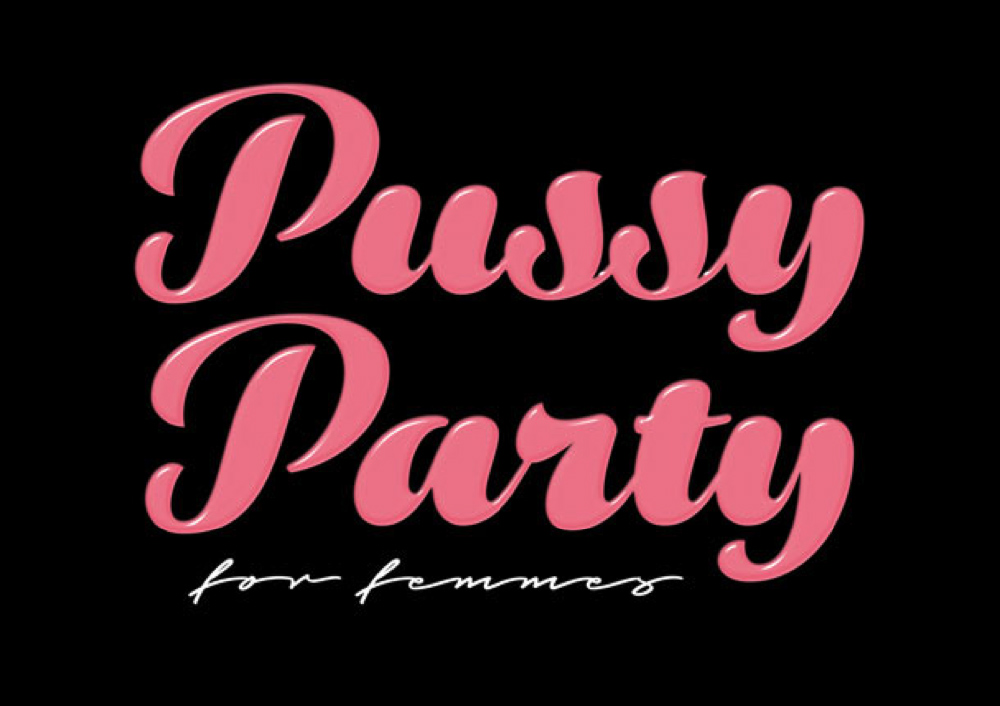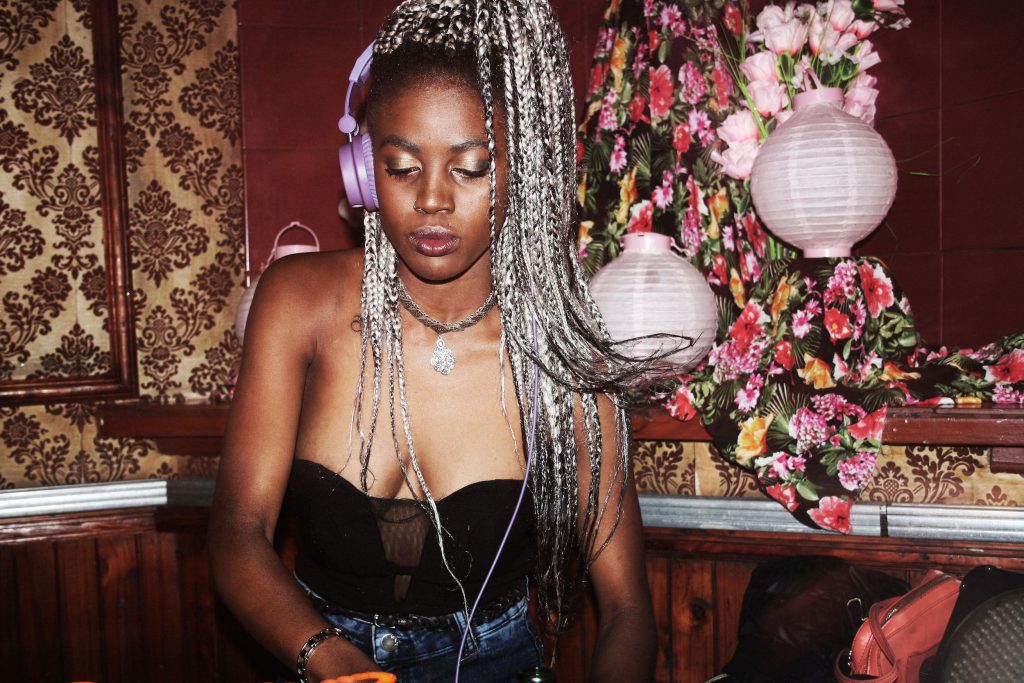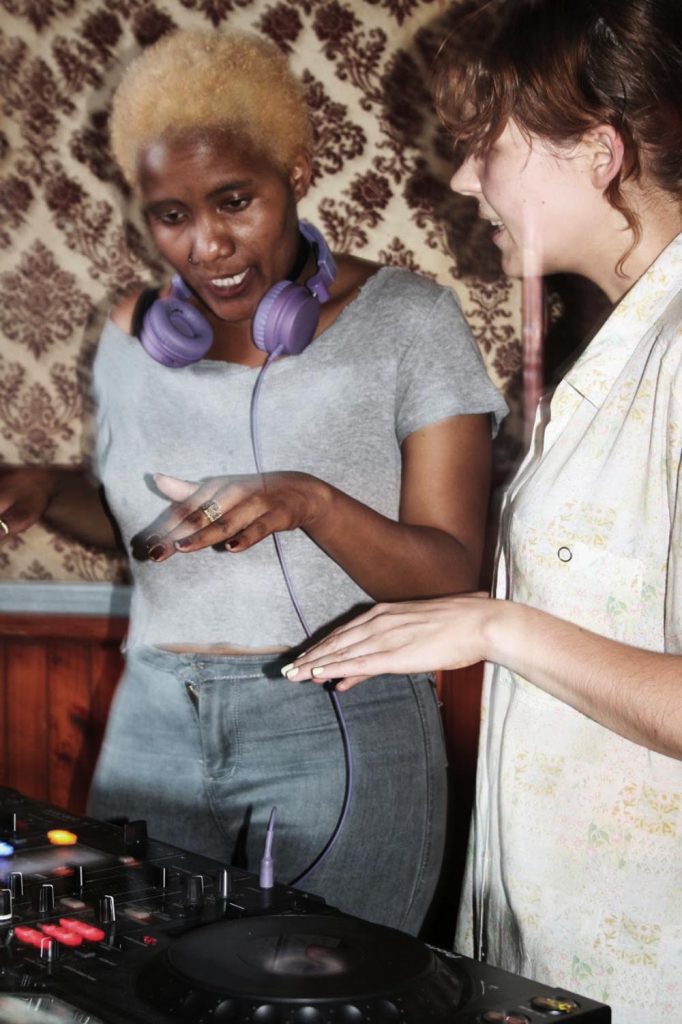The dance floor acts as a platform to owning your power, through music and conversation. Here, Pussy Party founders Rosie Parade and Phatstoki talk us through Kitchener’s demographics, empowering the femme in all genders & working on a mandate that incubates, exchanges and exposes new ideas.

There has to be a story behind the concept of Pussy Party. Who was involved in the beginning discussions?
Rosie Parade: The original concept came from Broaden A New Sound (BANS), which is myself and my partner, Ri. BANS is the music curator for Kitcheners, and I work the door most nights. Those two roles in combination kind of make BANS the ‘vibe curators’ at Kitcheners. We were encountering one issue on two fronts – booking line ups, we were struggling to book enough established femme acts; and on the door, I was struggling to keep the balance of energies in the club in check – the club was often overwhelmingly male in its energy (and demographic). The two problems have to be interrelated. Nightlife in Johannesburg is not a safe space for women, physically or spiritually. The city isn’t a safe space for women – and those dangers are amplified at night.
I’d been encountering and researching overseas movements that enact explicitly feminist agendas in the club space – collectives like Discwoman, parties like Papi Juice, Come Thru and Room for Resistance, and the Cómeme label.
BANS had also decided to shake up Kitchener’s Student Wednesdays, cutting out promoters who we felt were too old, and were booking DJs who were too old to really connect with the student demographic. We enforce a higher than usual age limit on the weekends, so we want Student Wednesdays to be about youth, and in the same breath about experimentation and opportunity.
Phatstoki came into the fold as a DJ for the first party, and then as a co-creator. We also use her photography for our poster art every month. I know Phatstoki from the dance floor, and it’s really important for Pussy Party that we aren’t activists throwing a party – we are party goers activating the dance floor.
Phatstoki: When Coco invited me to play the first Pussy Party, and mentioned that she’d like me to be a part of it regularly, I didn’t hesitate to say yes. Partly because I had been longing to play a live set, but mostly because the subject was very important to me. Centring a party on issues that need to be addressed in club culture is something I find very important.
Have the events been playing out the way you envisioned them?
Phatstoki: I can’t really say how I envisioned it at first, but I will say that seeing the positive response from fellow womxn made me realise how necessary the party actually is, more than I had imagined.
Rosie: My expectations are low, given that the status quo is so far from what we want to achieve. I was really surprised with the turn out for Dope Saint Jude in August – I knew we would have to put a bit of extra in for women’s month, even though fuck women’s month, and Dope Saint Jude was the perfect fit for our first out of town guest. At that party, we had more womxn in the club than men. I have never seen that in my life, and the impact was massive for the space.
On an average night it’s business as usual, more men than womxn. Its cool like that too, because what we’re really working on isn’t one night a month – we’re working on ways to solve problems that occur constantly in club culture. I feel like the femmes who are turning up to Pussy Party are not just celebrating – we aren’t that free yet. We are discovering and creating the tools to combat the persecution of femininity on the dance floor. And we can’t exclude men from the party to do that – we have to figure out how to rehabilitate our brothers from the patriarchy.
You guys use words such as practice, incubate, exchange and expose to cover what the Pussy Party platform is themed around. With that in mind, did you intend to to create a safe space for all guests and DJ’s and ensure they are free to reveal themselves no matter what race, class or aesthetic privilege they come from?
Phatstoki: I am what I am at all times, nothing I can switch off. With that said, I am aware that club spaces can make one feel like their existence attracts harm, more especially for femme identifying energies. From my understanding, the words we use lets people to know that it’s about changing the situation, little by little, with each other’s help, whether you’re on the dance floor, on the decks, as a womxn/ femme identifying being, this is the place you can share your issues with us, with each other. This is the time where you can be open to owning your power, through music, conversation, all this without having to explain why, and if you do want to explain why that’s okay too, this is the space for that…Well, for that night at least.
Rosie: Kitcheners is one of the more open-minded venues when it comes to music and policy, and that translates to it being a generally accepting place – in terms of race, class and aesthetic, there tends to be a mix of people already in the space. It is always the Kitcheners agenda to let DJs explore and experiment, to educate the crowd and surprise the dance floor. Of course, Pussy Party is no different. We start from the music, and watch the knock on effect unfold.
I think the most success that we’ve had with this ‘incubate exchange expose’ mandate has been the hours before the party when we run DJ workshops. Inevitably the workshop attendees talk and bond. I think it’s pretty intimate and revealing to DJs, especially early in your career when you are more driven by your own tastes than what a dance floor may or may not respond too.

Radical second wave feminists, who choose to be in the spotlight like Lana Del Rey and Beyonce, own their sexuality in many ways – a large part by way of physical appearance. Do you think finding your femme needs to be translated into the way you look or is it a mindset?
This would be a good place to elaborate on what we mean when we say ‘femme’. Femininity is an energy that exists in all genders. Dominant patriarchal society suppresses and oppresses that energy. In those who present as women, our femininity is used as vehicle to subjugate us. In those who present as men, our femininity is suppressed as weakness or anti-social behaviour. We liked the double-meaning of ‘pussy’ as both the anatomical object and a slur against so-called weakness. We call Pussy Party an experiment in amplifying feminine energy in the club, a gender non-specific femininity appreciation society. The sooner we free femininity from gender constructs, the sooner we can all benefit from the powers of that energy.
Phatstoki: I personally wouldn’t say it’s the way one looks; sexualising/gendering aesthetics is problematic to me. You can be a cis heterosexual man in a dress for all I care, it doesn’t mean your gender/sexuality is suddenly bent, it’s a dress, it’s not coding for who or what you are, clothing is preference, not a conclusion of what you identify as. With that said, I think it’s about the energy you bring out, how you identify is how you say it, how you live it it, how you feel, not necessarily what you look like.
Rosie: I’m a body-lover. I don’t buy into the mind/ body dichotomy – I want those things to be understood as interconnected. Part of the copy in Pussy Party is ‘pro-pleasure’ – a lot of the policing we experience as womxn is body-based. At the end of the day, you are the owner of your body. Living that is a feminist act, because the patriarchy teaches men that they are entitled to women’s bodies. That owning our bodies and sexualities as womxn is radical, is actually tragic. Chimamanda Ngozi Adichie spoke beautifully on Beyonce’s feminism recently… If that brand of feminism’s second wave, I think at Pussy Party we are riding the third wave.
As women, there are a number of means, such as cosmetics, new clothes, hair-dos, healthy food and specific exercises that all contribute towards body feminization. Do you have any hidden pleasures that makes you feel empowered and confident?
Phatstoki: Hidden pleasures that make me feel empowered and confident? Tequila. Lol
Rosie: I’m in a committed relationship with thongs. I have too much ass to be worried about fitting it into panties. Since I made the change, my sense of personal freedom just skyrocketed.
You’ve hosted an eclectic mix of woman, such as DJ Doowop, Lady Skollie, Rosie Parade and Lil Bow. Each has a signature style, a descriptive set of mannerisms, unique social media presence and different perspective on life. Is it important to host a variety of personalities in the space? How does it help with what you’re trying to create?
Part of the impetus behind Pussy Party was about how representation matters behind the decks. The DJ is in a position of power, and we need to see ourselves and a wide range of others in those positions. That is the subtle level of psychological conditioning that we need to recreate. As Broaden A New Sound, we are more interested in selection than mixing – more interested in a unique DJ who plays from their heart, than a ‘good’ DJ who plays it safe. By including prominent femme personalities, like Maria McCloy, who don’t necessarily DJ, we open up the possibilities in the space. By hearing music we don’t usually hear in the club, we are given licence to behave in ways we don’t usually behave in the club. If the guys don’t have to be pimps and the gals don’t have to be hoes, what happens? Who do we chose to be? We also make it a point to include femme energies across genders. We have Angel-Ho coming to join us in November. Their femininity is such a powerful aspect of their persona, which is not a gendered persona.
There is so much work that goes into being a womxn and often the curation behind the image becomes a concerned effort or thing. Is owning your femme part of something you learn along the way, from a parent, peer or media, or is it a calling from within?
Phatstoki: It could be different for many. Those are probably not the only ways of learning how to own your body/identity/self. Personally it was a bit of everything, how I got to own my body with little to no shame (I still get a little insecure at times) was little messages here and there throughout my life; like how they would blur two femme representing bodies kissing on national television but a “girl” and a “boy” kissing was never an issue (not even when it was an adult kissing a minor), meeting people who also found those hidden messages odd and being fortunate enough to converse with these people who feel the same way about the misrepresentation of our bodies. I could go on and on but these little monumental experiences gave way for me to question what was said to be good enough for the world or not.
Rosie: My process has been anchored on a calling from within. Although I’m a cishet white female and not so far from the 90s images of sexualised femininity I was fed, I grew up with terrible body image and did a lot of physical and emotional self-harm along the way, which I’m still recovering from. My process, like anyone’s, has been about finding what fits for me, and throwing ALL the rest away. There is so much more that you have to discard than you can comfortably take on. That being said, I have folders and folders of images of womxn who inspire me, aesthetically. I wish growing up I had body positive images of sexuality, like @trustmedaddy ’s instagram account. I think my sexual history could have been a lot healthier if I had experienced more healthy and diverse representations of sexual bodies. And I guess it’s not about femininity or masculinity – it’s about knowing and loving every inch of your own body, without gender binaries policing that.

Instagram accounts show femininity as a construction, and not something biological or inherent to any woman. For example, ‘If you follow these certain rules or image guidelines, you’ll get noticed.’ How much effort do you put into curating your digital persona and does it reflect the person you are from day to day?
Phatstoki: My digital persona isn’t really a place I curate with much thought, it basically centres around my thoughts, the work I do and the people I love and care about.
Rosie: My Rosie Parade page is probably my most carefully curated space. I have a distinctive feeling about what that aesthetic is and what it isn’t. It’s easier to build that aesthetic through found images than through images of myself. Curating my tastes into a coherent narrative through that persona helps me to self-identify and self-create. Rosie Parade inspires me to be the best Colleen I can be.
How do you challenge the stereotypes and off-centred opinions when it comes to the Pussy Party brand?
Phatstoki: Forever grappling. I for one am not a femme representing/identifying energy, I am constantly (whether be it through the media, my mother, a catcaller etc) made to feel like I am “less” of a womxn because of this. The way womxn have been portrayed for centuries is a misrepresentation of womxn as a whole; womxn who do not fit the popular description of what “femme identifying” is are literally erased, hardly ever considered, treated as if they are not human beings, as if they too do not exist, it’s a mess and so places like Pussy Party are spaces where we can challenge these “popular” inhumane opinions, confront stereotypes and let people know that some shit’s gotta change.
Music is a language of its own, with no constraint of gender, role or class. Tell us about this language at the parties. What kind of music can people expect?
The music will be as diverse as the line up. There is not set prescription, no rule book, no proposal. Best case scenario, you’ll be surprised at what you can dance to, and how that makes you feel.
Angel – Ho said in a recent interview with Fader that ‘music is always political.’ Having lined up their set for the next Pussy Party – is this vision something you are aligned with? If not, what does music mean for the community who come to explore the space?
Phatstoki: I agree with Angel-Ho’s statement, that’s why I’d never play certain songs or artists at Pussy Party, because that lyrical content or artist’s persona might be triggering to a lot of femme identifying energies that have been violated by cis men before in that space. These things matter.
Rosie: Responding for the club space, I think the dance floor is always political. Our social dynamics play out in very direct ways there. I see night life as a tool for transformation. The club is the perfect space for ritual healing, for experimenting with who we are not in the light of day. The dance floor can be a self-created community. When that space flows, there is catharsis. I guess what Angel-Ho is also alluding to is that politics is not something that happens in isolation, in Pretoria or whatever. As we recognise how politics shape and are enacted in our daily lives, we can become more critical and more able to deconstruct negative patterns in the structures, super-structures and microstructures of our daily, lived experience.
Images / Max Thomik
Pussy Party is proud to present NON Records founder Angel-Ho (CPT) for their official JHB debut.
The vengeful angel joins us to herald the obliteration of hegemonic structures, to debunk and destroy the remnants of colonial mentality, and advocate self-determination.
PLUS another very special debut, Mr Blouse joins us for their first ever LIVE performance.
Supported by
Fela Gucci
Rosie Parade
Phatstoki
Pussy Party pops the second Wednesday of every month, as part of Kitchener’s Student Wednesdays.
We exist to create a regular platform for femme DJs and artists to practice, incubate, exchange and expose. We are a pro-femme, pro-pleasure community. An experiment in amplifying feminine energy on dance floor. A group meditation on the concept of yeilding, beyond the gender binary.
Each party is preceded by DJ workshops for interested femmes. Enquire via email, or just come through to observe from 5pm.
playp.ssyparty@gmail.com
� FREE FOR THE HONEYS
� FREE WITH A VALID STUDENT CARD
� RADICAL SELF LOVE IN THE CLUB



